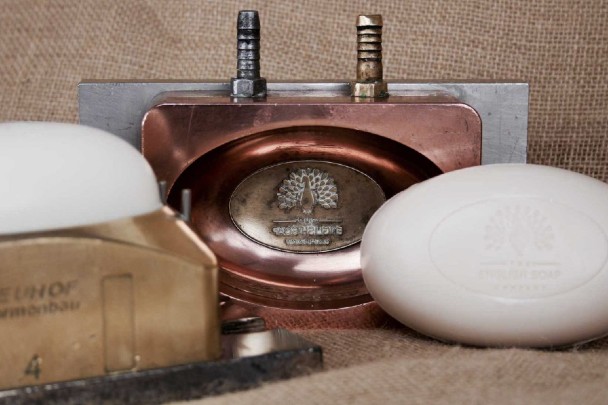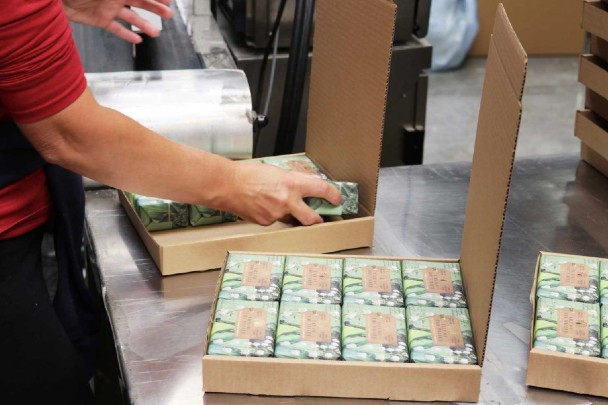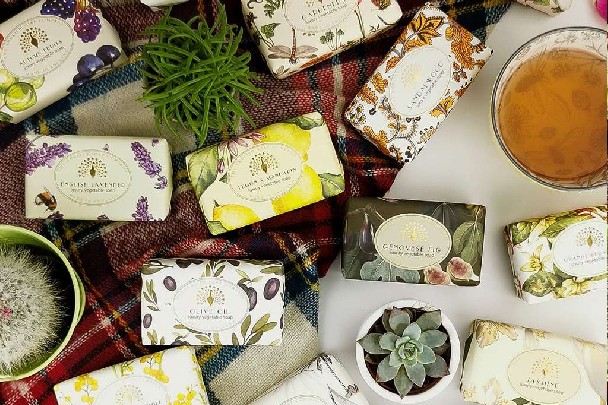From experimentation to commercial expansion
The English Soap Company is deeply rooted in the picturesque Sussex countryside.
The business began life in 2000 as a creative hobby for co-founders Bob and Juliet Butts after they stumbled across a pile of unused vintage soap moulds in a farm machinery workshop.
Using an old book on the alchemy behind traditional English soap-making, Bob began experimenting in his spare time, turning their kitchen into a quasi-laboratory before Juliet suggested they find a more suitable production space.
From there the couple moved operations onto the picturesque Silveroaks Farm in Waldron, East Sussex – where the team remains to this day – and soon began operating as Christina May, a private label manufacturer of premium handcrafted soaps. They worked hard perfecting their method. Each bar is made with a perfectly balanced vegetable oil base, shea butter and glycerine, to ensure it has a silky, smooth texture and fragrant lather.

Over time, Bob and Juliet built up their manufacturing capabilities and, within a few short years, had invested in a production line to meet commercial orders. Having developed a reputation for high-quality products, they soon began supplying their soaps to leading hotels, gift boutiques and international retailers.
In 2012, Bob and Juliet’s son Oliver joined the business as managing director, followed by his wife Ailsa as operations manager four years later.
Since then, the business has gone from strength to strength, picking up numerous awards, further scaling its operations and substantially growing the on-site team which now stands at 70.
Embedding its English heritage into a new premium gifts brand
With an already thriving private label business, by 2012 the team were looking to grow and diversify their international footprint so decided to create a standalone brand that reflected both the company’s rural heritage and traditional production methods. The ‘The English Soap Company’ was born.
With a range that now includes hand creams, body washes and perfumed candles, as well as its flagship soap bars, the brand’s USP is its position as a luxury range, explains brand and marketing manager, Kelsey Heaton.
“We differentiate ourselves in that we’re selling a utilitarian product, but we position ourselves in the gifting sector,” she explains. Much of this the brand achieves through its distinctive packaging and design. It’s in-house team of illustrators and designers dream up beautiful artisanal concepts for each product, be it whimsical cats enjoying a spa day, a trio of classical paintings for its festive gift sets or outdoor scenes personalised for Mother’s Day. Short messages or “pick me ups” are also used on the packaging to ensure each soap is positioned as a thoughtful gift, says Heaton.
As for many brands that primarily sold their products in ‘bricks and mortar’ stores, the pandemic proved to be a challenge for The English Soap Company.

With the stores stocking their products nearly all closed, the team was forced to pivot, focusing more heavily on their website and direct-to-consumer sales to keep the range getting into the hands of customers. That hard work paid off, and the channel now represents 10% of the brand’s sales.
In fact, the decision to diversify into branded products has transformed the overall business model, with exports now making up more than half (55 per cent) of company’s distribution and its products now sold in outlets across 40 countries.
In 2017 the brand achieved the “massive milestone” of partnering with Kew Gardens to create licensed products that are also sold at the on-site shops at its two botanical gardens. That range now includes a portfolio of products, including hand cream, perfume and body oil.
Despite all of their growth and continued success, minimising environmental impact has also been a top priority at The English Soap Company. Their soaps are made with zero animal products and all fragrances are sourced locally from a nearby perfumery. Manufacturing all takes place on the Sussex farm site and the brand is fully committed to using low-carbon materials, such as cardboard and biodegradable paper wraps, in their distinctive packaging, working with local suppliers wherever possible.
Using QR codes powered by GS1 to ‘transport’ customers
With such a distinctive product and rich story to tell, the team is now committing more time and investment to sharing their history, production methods and focus on sustainability with customers.
However, with space on-pack at a premium, The English Soap Company had a challenge on their hands.
Due to their small size, the physical packaging of their toiletry products was typically limited in space. At the same time, the brand’s distribution model meant it lacked a dedicated physical space to communicate the brands story, credentials and product attributes.
Though The English Soap Company’s soaps, and the rest of the range, are stocked in outlets renowned outlets such as garden centres and boutiques, these third parties locations don’t offer the same opportunities to share in-depth information with customers. This left the brand’s website having to “work very hard” to communicate everything the team would like to share, especially around methods of production and sustainability commitments, explained Heaton.

In search of a solution, the team decided to join the pilot programme for QR codes powered by GS1. Whereas barcodes can store and share plenty of vital information for a company like The English Soap Company, the information they carry is typically only accessible to those in the industry. But, by embedding a smart QR code on pack instead, it’s possible to fulfil all the same traditional business functions, while also creating a consumer-friendly gateway to a whole host of information for end consumers too.
Supported by GS1 UK’s partners at Orca Scan, The English Soap Company have implemented QR codes powered by GS1 that “transport” customers to multiple sources of dynamic, real-time content, all of which is tailored and specific to the actual product they hold in their hands.
At the scan of a smartphone, consumers can discover the rich heritage of the brand, how products are made, sourced and much more - all thanks to a simple scan of the back of their soap’s packaging, says Heaton.
Thanks to Orca Scan’s help and guidance, the set-up that was simple and easy to integrate and, Christmas 2023, the code was successfully added to 16 of the brand’s festive soaps.
Heaton says that it’s still early days but, with the right engagement from customers, there’s every chance QR codes powered by GS1 could provide the perfect way for the team to overcome the practical challenges they’ve faced when it comes to sharing their story of a creative hobby turned flourishing international brand.
Get started connecting your products
GS1 Digital Link
The GS1 Digital Link standard enables GS1 identifiers to be used as a gateway to online information.
GS1 Digital Link training
Now more than ever, consumers are looking for product transparency. Find out how advanced barcodes could power the future of commerce.
